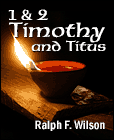
|
Old Testament
New Testament
Gospels
Acts
Paul's Letters
General Letters
Revelation
Topical Studies
Beginning the Journey (for new Christians). en Español

|
Old Testament
New Testament
Gospels
Acts
Paul's Letters
General Letters
Revelation
Topical Studies

|
Home
Bible Studies
Articles
Books
Podcasts
Search
Menu
Donate
About Us
Contact Us
FAQ
Sitemap
 Bertram Mackennal (Australian sculptor, 1863--1931), 'New Paul's Cross' (1910), bronze, St. Paul's Cathedral church-yard, London. |
These three brief letters -- 1 and 2 Timothy and Titus -- written from a first century apostle to his associates are quite relevant to the twenty-first century church. You'll find them especially helpful to develop yourself as a leader -- and train up leaders and new believers in your church to be godly, vibrant followers of Christ.
Pastoral ministry is what 1 and 2 Timothy and Titus are all about -- they are called the Pastoral Epistles.1 Timothy has been sent to Ephesus to help set a troubled church in order. Titus has been left in Crete to combat false doctrine and install leaders in newly-formed congregations. These letters are Paul's instructions, encouragement, and exhortations to help form Timothy and Titus into the kind of leaders that can succeed.
The churches in Ephesus and Crete seem to have some of the same kinds of problems we see in our churches today.
First, Paul is writing about churches that are weak in sound Christian teaching. The Pastoral Epistles use the "teach/teacher/teaching" word groups 21 times in just three brief letters.2 In our day, leaders need a personal renewal of their passion for teaching the Word, as "workers that have no need to be ashamed" (2 Timothy 2:15). Paul sees sound teaching as the irreducible core of a healthy, vibrant church.
Second, Paul exhorts his associates about courage in the face of people who would oppose their reforms. Timothy would rather face problem people with passivity rather than action. He is timid in the face of opponents. Paul exhorts him to boldness, towards being willing to suffer hardship. Relevant today? Oh, yes!
Third, Paul writes to a situation where those outside the Christian community have been neglected. Paul exhorts Timothy to fulfill his ministry and do the work of an evangelist and reminds us of the core of the gospel: "Here is a trustworthy saying that deserves full acceptance: Christ Jesus came into the world to save sinners!" (1 Timothy 1:15). Both Timothy and Titus are reminded how members' behavior influences the attractiveness of Christ and his Church to outsiders.3
Fourth, the churches have needs for solid leaders. Over my years in ministry, I've seen the desperate recruiting methods our churches use to fill key leadership roles. Sadly, We've drafted many people whose character flaws should have disqualified them from office, but We've gone ahead anyway, neglecting Paul's sound advice about selecting leaders.
Fifth, moral standards within the church had been compromised by the lifestyle of some of the leaders and their disciples. Paul urges Timothy to set an example of godliness among the believers. The "godliness/ungodliness" word group is used 16 times in these three letters.4 We serve in churches where the moral purity of the faith has been severely compromised by the prevailing mores of our culture to the degree that it's sometimes hard to tell Christians from non-Christians. Godly living is vital and relevant today.
I invite you to join me on a journey through 1 and 2 Timothy and Titus. This isn't a church manual of polity and rules of governance. Rather, it constitutes an apostolic crash course for leaders and would-be leaders on how to get our churches healthy again.
May God give us wisdom and conviction as we study, so that we may lead the church of Jesus Christ with skill and soundness through the challenges of the twenty-first century.
Yours
in Christ's service,
Dr. Ralph F. Wilson
Loomis, California
February 18, 2009
 Available in paperback, PDF, and Kindle formats. |
I wrote on 1 and 2 Timothy in 2009. In 2023, I added Titus to fill out the Pastoral Epistles. I've put these in their supposed order of writing -- 1 Timothy, Titus, and then 2 Timothy. You'll readily see that 1 Timothy and Titus have much in common. 2 Timothy is Paul's final letter that we possess.
Endnotes
[1] Incidentally, in October 2023, "pastoral" is pronounced PASS-tuhr-uhl, with the emphasis on the first syllable, according to Merriam-Webster.com and the Oxford English Dictionary. Merriam-Webster gives the pronunciation pass-TOR-uhl as "nonstandard." British pronunciation is on the first syllable. For the word "electoral," Merriam-Webster.com gives i-LEK-te-rel as the first pronunciation, e-lek-TOR-el as the second pronunciation. The Oxford English Dictionary shows only pronunciations with the emphasis on the second syllable.
[2] Eterodidaskeleō 1 Timothy 1:3; 6:3; didachē, 2 Timothy 4:2; didaktikos, 1 Timothy 3:2; 2 Timothy 2:24; didaskalia, 1 Timothy 4:1; 4:13; 4:16; 4:17; 6:1; 6:3; 2 Timothy 3:10; 3:16; 4:3; Titus 2:7; didaskalos, 2 Timothy 4:3; didaskō, 1 Timothy 2:12; 4:11; 2 Timothy 2:2; Titus 1:11; kalodidaskalos, Titus 2:3; laleō, Titus 2:1.
[3] 1 Timothy 5:14; Titus 2:5, 8, 10; 3:1-2.
[4] Asebeia, 2 Timothy 2:16; Titus 2:12; eusebeia, 1 Timothy 2:2, 10, 3:16; 4:7, 8; 5:4; 6:3, 5, 6, 11; 2 Timothy 3:5; Titus 1:1; eusebōs, 2 Timothy 3:12; Titus 2:12.
Copyright © 2026, Ralph F. Wilson. <pastor![]() joyfulheart.com> All rights reserved. A single copy of this article is free. Do not put this on a website. See legal, copyright, and reprint information.
joyfulheart.com> All rights reserved. A single copy of this article is free. Do not put this on a website. See legal, copyright, and reprint information.


 To be notified about future articles, stories, and Bible studies, why don't you subscribe to our free newsletter, The Joyful Heart, by placing your e-mail address in the box below. We respect your
To be notified about future articles, stories, and Bible studies, why don't you subscribe to our free newsletter, The Joyful Heart, by placing your e-mail address in the box below. We respect your